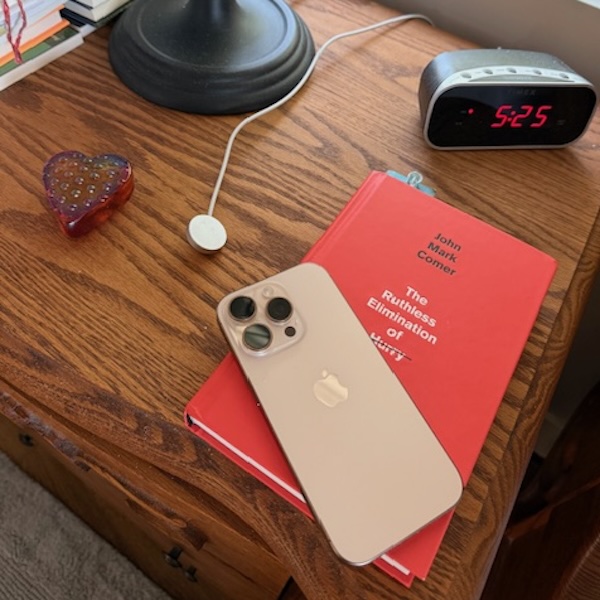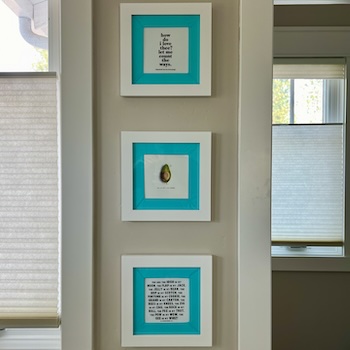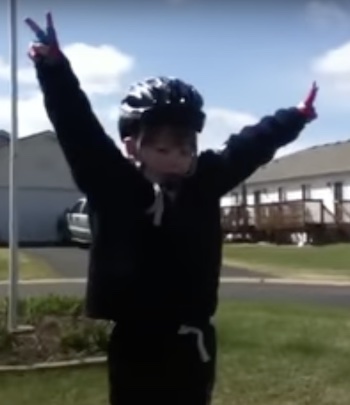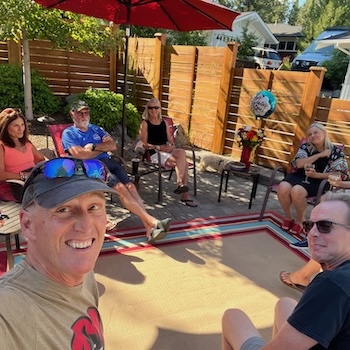
Two Saturday nights ago, I was reading John Mark Comer’s The Ruthless Elimination of Hurry in bed. I have read his previous book, Practicing the Way a couple of times, but this was my first time diving into his previous book. While his Elimination of Hurry book is written from a Christian perspective, many of the concepts have general applicability. In fact, some passages brought to mind my readings in Michael Easter’s Comfort Crisis and Scarcity Brain. We have done too good a job of killing boredom in our modern lives, and the constant stresses and dopamine hits are rewiring our brains, and not in a good way.
I often speak to groups about the importance of building margin into our lives; margin of time, energy and money. I’m starting to wonder if I need to add… margin of attention. Maybe it’s covered by time and energy, you definitely will need time and energy to pay attention. But I think it’s more nuanced than that.
One of the great things about ultralight backpacking, and I guess wilderness time in general, is how it gets me off my phone. Once I get out of cell phone range, there’s nothing I can check on. After three days, I stop thinking about my myriad to-do lists. When the only real things I need to think about are route-finding, where the next water is, and where I’ll be sleeping tonight, that leaves a lot of brain bandwidth unused. I don’t bring things to listen to (that would require additional weight in batteries, solar chargers, etc). So that leaves having conversations with others on the trail, or just solitude.
Both those scenarios (long connections with others and solitude) are extremely rare these days in most of our lives. It’s hard, for me at least, to just be present with someone for long periods of time. My mind gets to thinking about items on my list, or things that I need to put on my list. When you have nothing really to do all day but walk, there’s time to be present.
Solitude without stimulation is also something that most of us probably don’t experience on a regular basis. I recently spoke with a new attorney friend who took a leave of absence to thru-hike the Pacific Crest Trail. The biggest thing he noticed, and appreciated, was the solitude. With nothing to do but walk, and no ability to return calls or emails, work on cases or projects, there’s an unburdening, a lightness, and you find your mind meandering as your feet walk.
So, back to Saturday night. I decided on the spur of the moment that I wouldn’t look at my phone the next day, and in fact not carry it with me. It was an illuminating experiment.
The first thing I found out is that I missed a 9 am appointment. All my appointments are on my phone. So I figured out that next time, I need to peek at the calendar first. Actually, even before that, I had to improvise. I start my mornings in prayer, reading my bible, and meditating. I have a paper bible, and a mental prayer list, so those worked seamlessly. But for the meditation, I use the Headspace app. Well, no phone means no app. So I set myself a 10 minute timer, and it worked surprisingly well. Maybe I can cancel that subscription and save $12 a month…
I noticed that my right front pants pocket felt light, like something was missing. I’m so used to the weight of the phone always being there, I was acutely aware of its absence. We had new friends coming over at 10 for brunch (I did remember that much), and thought maybe I should check my phone in case there were texts concerning that. But I resisted, and guess what, they showed up at 10!
I realized, no surprise really, how often I use my phone for various tasks; to check the weather forecast before heading out, for navigation, to check on facts or research something that comes up in conversation, to take photos. Communication is a huge one of course; 5 email addresses, texts, Messenger, LinkedIn messages, Instagram messages, Slack, etc. There are a lot of different channels to monitor, and for each one, mixed in with the messages from real people that you have some kind of connection with, there are a ton of ‘messages’ from people you don’t know, but are trying to scam/sell/subscribe you. For me the more pernicious issue is that when checking for texts, it’s too easy to notice that’s there’s some new activity on LinkedIn/Facebook/Instagram, and do a quick check of that that turns into minutes I didn’t want to spend there.
I did cheat a little. We did a hike, and I wanted to have my phone with me to make sure we didn’t get our new friends lost in the woods. But I didn’t take any photos, and didn’t check it except the Avenza app. When we got home, I took it back out of my pocket.
We went to the Sting concert that evening with friends. I didn’t have my phone to pay for anything, but my old—fashioned credit card in my wallet worked fine. And I didn’t have to worry about taking photos, I could just be present and enjoy the music. Francie brought her phone, so there are still photos of the event; it would be a harder test for neither of us to take our phones.
As the evening wore down, I did enter my nightly weight into the phone (another use I forgot about), but then quickly put in on the charger. I found I enjoyed the lessened distraction. It’s probably not realistic to do it on a more regular basis, but I’m definitely planning to do it again next Sunday (after checking the calendar first).
Emboldened by last Sunday’s experience, I left the phone on the charger for this last Sunday. It went more smoothly (I remembered to check first for appointments this time). The one thing I did find was that adding or modifying a future appointment was inconvenient without the phone. I did cheat once… I have a buddy who just had surgery that I wanted to text. I have my iPad to read my papers in the morning, and while it doesn’t have email on it, it does do messaging. So I used that to check in with him.
Another thing I missed the phone for was Contacts. It’s so convenient to check names and addresses when it’s in your pocket.. not so much if you have to go find the computer, or turn on Siri on the watch. Checking the weather and setting timers for baking work from the Apple Watch, so I didn’t miss those functions. I also use my phone for language practice on Duolingo or Babbel, haven’t figured a way around that, but I don’t have any big streaks going, so that’s okay. And besides, I guess I could do the ‘unplug’ from sundown-to-sundown and still squeeze in a language practice.
I could get smarter about using my iPad, which I use for very limited things. But I like the digital detox/slowdown. One thing I use my phone for is logging my time. It’s habit even though I’m no longer billing for my hours; it helps keep me accountable for what I’m accomplishing in the time I have. This was actually a nice benefit, not being able to log time, somehow freeing. One day a week without a phone is not much, but I found it impacted the pace of the day, and what I did. I wonder if I can expand it to Saturday?






Glen,
Your post got me thinking. I often feel like I am spending too much time in front of one screen or another, and yet there are many “legitimate” uses of such devices, like actually using them as Phones, appointment calendars, and texting to keep in touch. But the other day when I was in a tyvek suit stripping sodden insulation from a friend’s house, when Monica called or texted me I simply answered with my watch…and that got me thinking. The Apple Watch I have (and others I assume) are very handy for many basic tasks, but they are actually quite hard for things that we generally identify as wasting time. Web browsing? Not worth it. Social Media? Ditto. The only thing I use often that is absent is Apple Maps. If my watch were the model with cellular built in, I could pretty much do without a phone and all the temptation to distraction it brings. I would have to do a little research on battery life, but it seems possible.
Have you thought of trying that Glen?